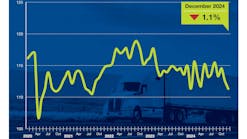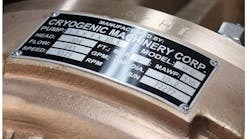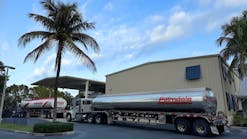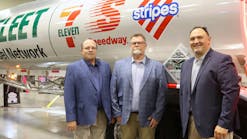NTTC returned to Chicago, Illinois, for the association's 62nd Annual Conference and Tank Truck Equipment Show, which was held May 10-12 at the Marriott Magnificent Mile Hotel. Over the years, Chicago has been a popular venue for NTTC's annual conference, which has returned to the Windy City five times since 1990.
Reflecting on the past year, NTTC's 2009-2010 chairman Jeff McCaig said 2009 “was one of the most difficult for tank truck carriers, our customers, and service suppliers in this industry's long history. The good news is that we are starting to see signs of a gradual but sure recovery.”
The impact of the economy, political issues, and new safety regulations dominated the conference. Attendees were treated to a rare look inside the White House by Samuel K Skinner, former US Secretary of Transportation and Chief of Staff to President George H W Bush.
Skinner cautioned that president Barack Obama does not seem to share the same transportation objectives as NTTC members, and that will be a problem for the industry. The White House is driving Transportation Department priorities that put a greater emphasis on high-speed rail and other alternative transport initiatives.
President Obama shows little interest in highway infrastructure improvements that could reduce the growing traffic congestion and enhance road safety. “The Highway Trust Fund is inadequate for our current infrastructure needs, but President Obama is unlikely to call for a fuel tax increase,” Skinner said. “Competition for tax revenues is growing more intense, and we need to alternative funding options.”
Skinner described the Obama Administration as aggressively pro-labor. “In fact, Barack Obama is the most pro-labor US president in years,” he said. “Among unions, the Service Employees International Union controls a big part of the policy process in this administration.”
Skinner went on to say that President Obama has surrounded himself with staffers and appointees who have little respect for the private sector and naively believe that bigger government will solve the nation's problems. “President Obama and most of his team lack private sector experience and don't appreciate that part of the economy,” he said. “It is an administration that is heavy on academia and knows little or nothing about how the economy really works.”
The view of big government at the solution for all problems was a big driving factor in the push to pass the national health care program. “The health care system in America had problems, but it wasn't broken,” Skinner said. “It didn't need a big government fix. The new system has problems of its own, including time bombs such as a half billion dollars in Medicare cuts and the likelihood that employers are going to bail out of the current health insurance system. Public health care is going to be a disaster.”
Skinner chided President Obama for the runaway spending associated with the various stimulus programs enacted over the past year. “All of that stimulus spending was ineffective,” he said. “It didn't create any jobs in the marketplace.”
The economy that the stimulus program was supposed to help was the focus for Bob Costello, chief economist for the American Trucking Associations. He brought some good news for the conference attendees.
“While there are still some threats ahead, the economic environment continues to improve for trucking,” Costello said. “The current growth cycle is sustainable, and trucking is making good gains. For instance, tank truck loads were growing at a 6.5% rate through March, and tank truck revenue per mile increased by 2.8% during that same time.”
With the economic growth has come a bounty of loads for a tank truck industry that went through a significant downsizing during the deepest part of the recession. “Once supply and demand reach a point of near equilibrium, we're likely to witness the tightest capacity environment the industry has ever faced,” Costello said. “We're not going to have enough drivers or trucks.”
The truckload side is already dealing with tighter fleet capacity, as evidenced by spot market pricing, Costello said during the May meeting. Tank fleets are reporting a similar situation, with only the less-than-truckload sector still reporting over capacity.
Factors contributing to tighter capacity include driver layoffs and a significant reduction in fleet power units. Fleets exported a significant number of used Class 8 tractors over the past few years, and many carriers have indicated that they will not buy significant numbers of new trucks until at least 2011.
More financing for new equipment purchases is becoming available from banks and other institutions, according to David Thomas with Bank of America. Many carriers paid down debt during the recession, which improved their balance sheets and made them a more attractive risk. Trucking is attractive to lenders because it provides an essential service and operates a lot of capital assets.
Regulatory factors, particularly the Federal Motor Carrier Safety Administration's new Comprehensive Safety Analysis 2010, are expected to contribute to the growing truck fleet capacity shortage. A trio of speakers provided an update on CSA 2010.
The advent of CSA 2010 has created a new category called “uninsurable drivers,” according to Robert J Henry of Scopelitis, Garvin, Light, Hanson & Feary PC. “While CSA 2010 is far from finalized and there is a rulemaking process to be completed, we have some things from which we can predict the future,” he said. “In the insurance industry, there are already certain drivers or categories they don't want to insure.”
Tom Bray, JJ Keller and Associates Inc, described CSA 2010 as a “system that involves putting SafeStat on steroids and automatically rating carriers based on data, and these ratings then lead to ‘relevant interventions.’ ”
“CSA 2010 is a more comprehensive approach than the present system of collecting data and then using that data to decide who to intervene with, and then rating the carrier after the intervention,” he said.
Jim Angel, PeopleNet, said that given the feedback PeopleNet has gotten from hundreds of clients attending webcasts given on this topic, it is clear that there is a lot of confusion in the market and, in many cases, a true lack of education and awareness of how the CSA 2010 regulations will impact fleets, their drivers, and their businesses in a real, immediate, and fundamental way. “There will definitely be some pain, but it will be worth it in the end,” he said.
CSA 2010 is certain to impact shipper-carrier relationships, and it should give carriers greater leverage. However, Paul Little of Logistics Safety Solutions Inc contended that price will always dominate the decision making process for the shippers that are served by the tank truck industry. He said good shipper-carrier alliances are the only way to move beyond price.
Stephen J Rush, president of Carbon Express Inc, was elected 2010-2011 chairman. Previously, Rush was Region I vice-chairman.
NTTC's 63rd Annual Conference and Tank Truck Equipment Show will convene in Baltimore, Maryland. The event will be held May 15-17, 2011 at the Renaissance Harborplace Hotel.








